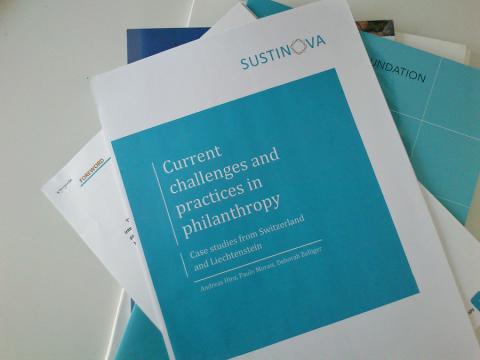Project selection - Philanthropy series, Issue 1

What are the challenges and current practices of grant-making foundations and project initiators?
From the selection criteria for grantees to the value of reporting, we collected the perspectives of 20 organisations in Switzerland and Liechtenstein.
The final report of our first study on philanthropy and project development, with a focus on selection and funding, can be downloaded in the link above .
The present study examines practices and challenges faced by grant-making foundations and by project initiators regarding the selection, monitoring and evaluation of projects. The relationship between both groups, organisational learning, demand for external services and changes in the philanthropy landscape are assessed.
- 11 grant-making foundations and 9 project initiators from Switzerland and Liechtenstein were assessed via case studies between April and September of 2013. The choice of participants focused on organisations noted for their emphasis on sustainability, although the topics above were examined in a more generic way. The choice of organisations aimed for a certain level of diversity in terms of structure and size, volume of projects, years of activity and approaches followed.
- The results show how most foundations adopt a mix of strategies to attract suitable candidates and how selection criteria and risk management measures tend to emphasize organisational factors over project-related ones. Selection and funding of projects are seen as the core activities of foundations, but with differences in strategies. Monitoring and reporting are conducted by all foundations but internal resource constraints often limit the scope of action. Evaluation of impact and promotion of organisational learning are less frequent due to internal limitations and lack of generic methodologies.
- Foundations conduct all processes and decision-making internally, tending to resort to their network or external experts only for specific tasks. The level of interaction with initiators varies within the sample but challenges are commonly felt by all supporters when trying to establish a clear communication, manage expectations and develop a relationship of trust.
- Regarding the initiators’ side, the analysis is primarily focused on fundraising and the interaction with supporters. The effort and obstacles associated with these activities are assessed, as are the strategies to deal with them. The predominant challenges relate to the lack of transparency and feedback from most donors and the high diversity of requirements for funding and reporting. The findings demonstrate how the efficiency level of initiators is negatively impacted by the interplay of these factors.
The findings of the study highlight challenges and the diversity of approaches taken by grant-making foundations and project initiators. Throughout the results and conclusion sections, approaches and examples of best practices are highlighted and discussed.
